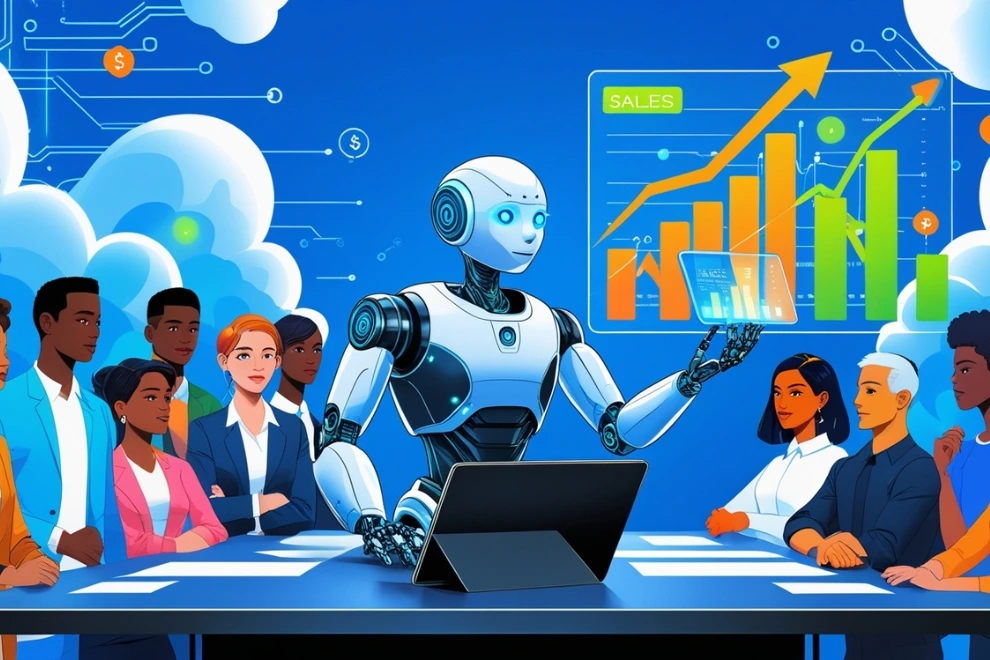In the fast-paced world of business, staying ahead of the competition requires innovation, agility, and the ability to adapt to emerging technologies. Among the most transformative technologies of our time is Artificial Intelligence (AI). AI is no longer a futuristic concept; it is here, and it is revolutionizing industries across the board. One area where AI is making a particularly profound impact is in sales and lead generation. By leveraging AI, businesses are unlocking unprecedented growth, efficiency, and customer satisfaction. In this blog, we will explore how AI is reshaping the sales landscape, the benefits it brings, and why it is essential for businesses to embrace this technological revolution.
The Evolution of Sales and Lead Generation
Traditionally, sales and lead generation have been labor-intensive processes. Sales teams would spend countless hours cold-calling, emailing, and networking to identify potential customers. Lead generation often involved manual data entry, guesswork, and a significant amount of trial and error. While these methods have worked to some extent, they are time-consuming, inefficient, and often yield inconsistent results.
Enter AI. With its ability to analyze vast amounts of data, predict outcomes, and automate repetitive tasks, AI is transforming the way businesses approach sales and lead generation. By harnessing the power of AI, companies can now identify high-quality leads, personalize their outreach, and close deals faster than ever before.
How AI is Revolutionizing Sales and Lead Generation
1. Predictive Analytics: Identifying High-Quality Leads
One of the most significant advantages of AI in sales is its ability to use predictive analytics to identify high-quality leads. AI algorithms can analyze historical data, customer behavior, and market trends to predict which leads are most likely to convert into paying customers. This allows sales teams to focus their efforts on the most promising prospects, rather than wasting time on leads that are unlikely to result in a sale.
For example, AI-powered tools like Salesforce Einstein and HubSpot use machine learning to score leads based on their likelihood to convert. These tools take into account factors such as website visits, email engagement, and social media activity to provide a comprehensive lead score. By prioritizing high-scoring leads, sales teams can optimize their efforts and increase their chances of success.
2. Personalization at Scale: Tailoring Outreach to Individual Needs
In today’s competitive market, personalization is key to winning over customers. AI enables businesses to personalize their outreach at scale, ensuring that each prospect receives a tailored message that resonates with their specific needs and preferences.
AI-powered tools can analyze customer data to create highly personalized email campaigns, product recommendations, and marketing content. For instance, AI can analyze a customer’s browsing history, purchase behavior, and demographic information to recommend products or services that are most relevant to them. This level of personalization not only increases the likelihood of conversion but also enhances the overall customer experience.
3. Chatbots and Virtual Assistants: Enhancing Customer Engagement
AI-powered chatbots and virtual assistants are revolutionizing customer engagement by providing instant, 24/7 support to potential leads. These intelligent tools can answer common questions, provide product information, and even guide customers through the purchasing process.
Chatbots like Drift and Intercom use natural language processing (NLP) to understand and respond to customer inquiries in real-time. By automating these interactions, businesses can ensure that no lead is left unattended, even outside of regular business hours. This not only improves customer satisfaction but also frees up sales teams to focus on more complex tasks.
4. Sales Forecasting: Making Data-Driven Decisions
Accurate sales forecasting is crucial for businesses to plan their strategies, allocate resources, and set realistic goals. AI is transforming sales forecasting by providing more accurate and data-driven predictions.
AI algorithms can analyze historical sales data, market trends, and external factors such as economic conditions to predict future sales performance. This allows businesses to make informed decisions and adjust their strategies accordingly. For example, if AI predicts a downturn in sales, a company can take proactive measures such as increasing marketing efforts or offering promotions to mitigate the impact.
5. Automation: Streamlining Repetitive Tasks
Sales teams often spend a significant amount of time on repetitive tasks such as data entry, scheduling meetings, and following up with leads. AI-powered automation tools can streamline these tasks, allowing sales teams to focus on building relationships and closing deals.
Tools like Outreach and SalesLoft use AI to automate routine tasks such as sending follow-up emails, scheduling appointments, and updating CRM records. By automating these processes, businesses can increase efficiency, reduce human error, and ensure that no lead falls through the cracks.
6. Sentiment Analysis: Understanding Customer Emotions
Understanding customer emotions and sentiments is crucial for effective sales and lead generation. AI-powered sentiment analysis tools can analyze customer interactions, such as emails, social media posts, and chat conversations, to gauge their emotions and attitudes.
By understanding how a customer feels about a product, service, or brand, sales teams can tailor their approach to address any concerns or objections. For example, if a customer expresses frustration in a chat conversation, a sales representative can respond with empathy and offer solutions to resolve the issue. This level of emotional intelligence can significantly improve customer relationships and increase the likelihood of conversion.
7. Dynamic Pricing: Maximizing Revenue
AI is also transforming the way businesses approach pricing strategies. Dynamic pricing, powered by AI, allows businesses to adjust prices in real-time based on factors such as demand, competition, and customer behavior.
For example, e-commerce platforms like Amazon use AI to analyze market conditions and adjust prices dynamically to maximize revenue. By offering the right price at the right time, businesses can attract more customers and increase their sales.
The Benefits of AI in Sales and Lead Generation
The integration of AI into sales and lead generation offers numerous benefits for businesses, including:
- Increased Efficiency: AI automates repetitive tasks, allowing sales teams to focus on high-value activities.
- Improved Accuracy: AI-powered predictive analytics and forecasting provide more accurate insights, reducing the risk of human error.
- Enhanced Customer Experience: Personalized outreach and instant support through chatbots improve customer satisfaction and loyalty.
- Higher Conversion Rates: By focusing on high-quality leads and tailoring outreach, businesses can increase their chances of closing deals.
- Data-Driven Decisions: AI provides actionable insights that enable businesses to make informed decisions and optimize their strategies.
Challenges and Considerations
While the benefits of AI in sales and lead generation are undeniable, there are also challenges and considerations that businesses must keep in mind. These include:
- Data Privacy: The use of AI requires access to large amounts of customer data, raising concerns about data privacy and security. Businesses must ensure that they comply with data protection regulations and implement robust security measures.
- Integration: Integrating AI tools with existing systems and processes can be complex and time-consuming. Businesses must carefully plan and execute their AI implementation to avoid disruptions.
- Cost: AI-powered tools and technologies can be expensive, particularly for small and medium-sized businesses. It is essential to weigh the costs against the potential benefits and ROI.
- Ethical Considerations: The use of AI in sales and lead generation raises ethical questions, such as the potential for bias in AI algorithms. Businesses must ensure that their AI systems are fair, transparent, and accountable.
The Future of AI in Sales and Lead Generation
As AI technology continues to evolve, its impact on sales and lead generation will only grow. We can expect to see even more advanced AI-powered tools and technologies that further enhance efficiency, accuracy, and personalization.
For example, the integration of AI with other emerging technologies such as the Internet of Things (IoT) and augmented reality (AR) could open up new possibilities for sales and lead generation. Imagine a future where AI-powered AR tools allow customers to visualize products in their own homes before making a purchase, or where IoT devices provide real-time data that AI can use to predict customer needs and preferences.
AI is revolutionizing sales and lead generation by providing businesses with the tools and insights they need to succeed in today’s competitive market. By embracing AI, businesses can unlock unprecedented growth, efficiency, and customer satisfaction. However, it is essential to approach AI implementation with careful planning, consideration of ethical implications, and a focus on data privacy and security. The future of sales and lead generation is here, and it is powered by AI. Are you ready to embrace the revolution?


